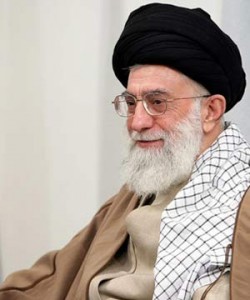Iran “is weighing a more confrontational strategy” that would “boost levels of uranium enrichment unless the West makes clear concessions to ease sanctions,” according to the Associated Press.
 Mansour Haghighatpour, deputy head of Iran’s influential National Security Committee in parliament, told the Associated Press that the decision to take a more defiant stance came only after the US and its allies have imposed harsh economic sanctions while refusing to make concessions in any viable negotiated settlement.
Mansour Haghighatpour, deputy head of Iran’s influential National Security Committee in parliament, told the Associated Press that the decision to take a more defiant stance came only after the US and its allies have imposed harsh economic sanctions while refusing to make concessions in any viable negotiated settlement.
“The West now has a chance to strike a deal with Iran,” Haghighatpour told the AP. “Perhaps we may need to produce nuclear fuel for large commercial vessels that need 60 percent purity.”
This new posture, which Iran has not yet been committed to, suggests the economic warfare, threats of preventive war, and overall bellicose approach that the US, Israel, and their European allies have taken is not effective.
Obama has been criticized for a supposed diplomatic opening towards Iran, which hawks like GOP nominee for president Mitt Romney claim gave Iran time and space to expand their nuclear program.
But two experienced academics and diplomats, writing in Foreign Affairs say the so-called diplomatic opening Obama brought was anything but: “for the past three years, the United States and Europe have stubbornly refused to seek a negotiated solution with Iran,” they write.
Rolf Ekéus, Executive Chairman of the UN Special Commission on Iraq from 1991 to 1997, and Målfrid Braut-Hegghammer, Stanton Nuclear Security Junior Faculty Fellow at the Center for International Security and Cooperation at Stanford University, write that “calling for war while intensifying pressure on Iran, without also clearly defining steps Tehran could take to defuse the tension, removes any incentives for Iran to change its behavior.”
Most of the so-called diplomacy with Iran has been “predicated on intimidation, illegal threats of military action, unilateral ‘crippling’ sanctions, sabotage, and extrajudicial killings of Iran’s brightest minds,” writes Reza Nasri at PBS Frontline’s Tehran Bureau.
After the failed talks in 2009 and 2010, wherein Obama ended up rejecting the very deal he demanded the Iranians accept, as Harvard professor Stephen Walt has written, the Iranian leadership “has good grounds for viewing Obama as inherently untrustworthy.” Former CIA analyst Paul Pillar has concurred, arguing that Iran has “ample reason” to believe, “ultimately the main Western interest is in regime change.”
“The West feels sanctions are biting and this is forcing Iran to return to the negotiating table. That’s wrong. We never left the table. Sanctions have been harmful but will never make us give up our nuclear activities,” said lawmaker Hossein Naqavi, spokesman for the Iranian parliament’s Security Committee. “Pressures, sanctions and military threats won’t make us retreat.”


